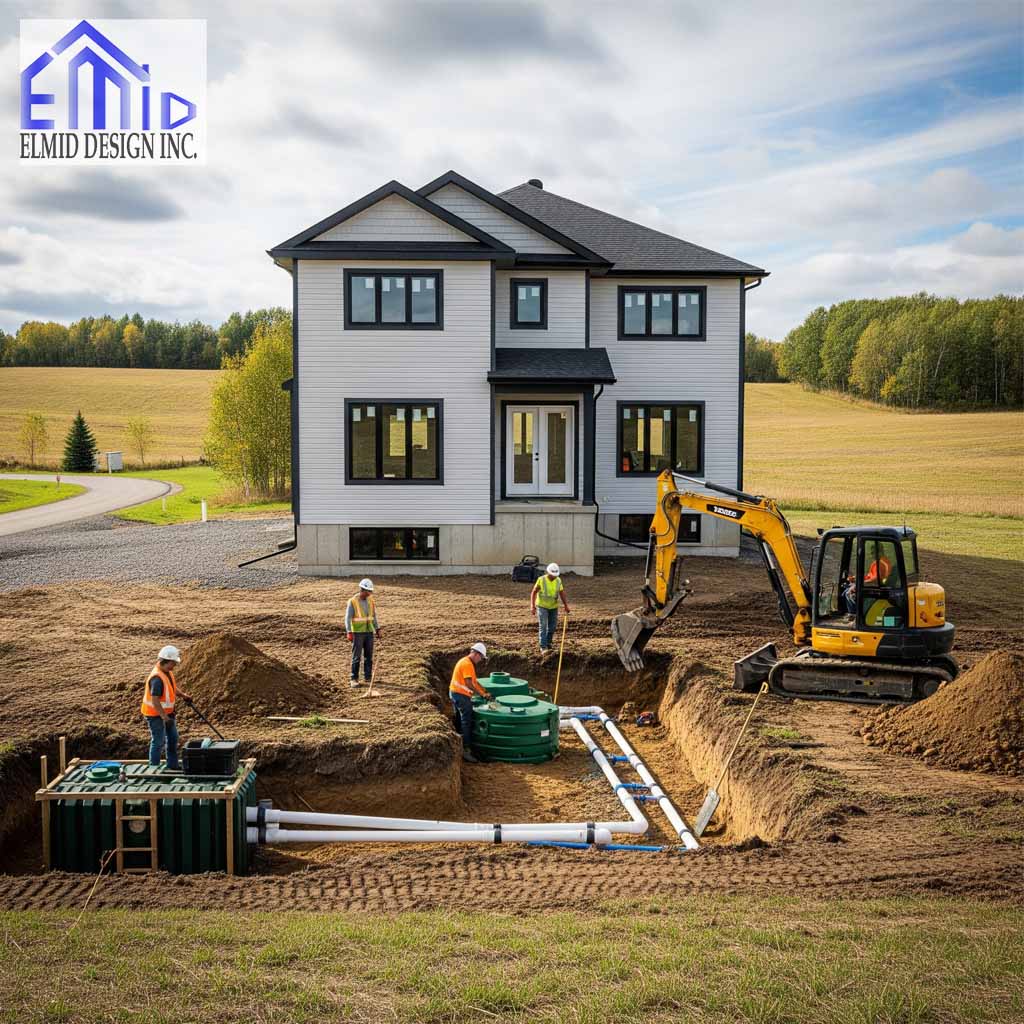Septic design in Tottenham is a crucial service for homeowners and developers who need efficient and code-compliant wastewater solutions. Whether you’re building a new home or upgrading an existing system, the right design makes all the difference. Septic systems must follow local regulations, manage soil limitations, and fit into the property layout without future issues. In Tottenham and surrounding areas, qualified professionals handle every detail—site evaluation, system sizing, and permit-ready plans. Choosing the right service ensures your system performs efficiently while meeting all municipal and provincial standards.
Key Takeaways
Septic system design in Tottenham must follow Simcoe County and Ontario Building Code requirements
Site evaluations and percolation tests are mandatory to begin the process
Licensed septic designers and engineers create permit-ready plans
Proper design improves long-term system performance and reduces future costs
Local firms like Smith Excavating and Elmid Design Inc. bring decades of expertise and engineering authority
Understanding Septic Design in Tottenham
A septic design is more than a sketch of tanks and pipes. It’s a plan rooted in geology, engineering, and regulation. In Tottenham, all new septic systems must meet the Ontario Building Code. This means the site must be tested for soil absorption, water tables, and setbacks from property lines and wells. Designers then calculate daily flow rates, select the appropriate tank size, and plan the drainage bed based on soil conditions. Local professionals like Smith Excavating handle design and install services. For complex sites or larger systems, engineering firms like Elmid Design Inc. step in with stamped plans and full regulatory compliance.
Site Evaluation and Soil Testing
Every septic system begins with a detailed site inspection. Soil type, slope, depth to bedrock, and water table levels all affect the design. Percolation tests determine how fast water drains from the soil. Sandy soil drains quickly and may allow for smaller fields. Clay-heavy soils drain poorly and require more area or alternative systems. In Tottenham, this step ensures the system meets both local zoning bylaws and provincial guidelines. Licensed septic professionals perform these tests and submit the data with permit applications. This reduces delays and ensures proper system sizing from day one.
Septic Permit Process in Simcoe County
The permit process in Tottenham follows Simcoe County’s building division rules. Before construction, applicants must submit a detailed septic design prepared by a licensed designer or P.Eng. The design includes tank capacity, absorption trench layout, and setbacks. The county reviews this plan to ensure it complies with health and environmental safety standards. Turnaround times can vary, but working with a professional speeds up approvals. Firms like Elmid Design Inc. ensure all engineering drawings meet the Ontario Building Code and local requirements, preventing costly revisions later.
Choosing Between Septic Designers and Engineers
Homeowners in Tottenham often wonder whether they need a licensed designer or a professional engineer. For simple systems on easy terrain, licensed designers can handle everything from soil testing to final installation. But complex properties—tight lots, high water tables, or commercial applications—require engineering oversight. Elmid Design Inc., a firm authorized by Professional Engineers Ontario, specializes in these advanced designs. Their services offer added trust, stamped drawings, and peace of mind for both clients and permitting authorities. Hiring the right level of expertise saves time and ensures long-term system performance.
Common Types of Septic Systems in Tottenham
Tottenham properties typically use one of several septic system types. The most common is the conventional trench system, suitable for well-drained soils. Raised bed systems are used where water tables are high or soils drain poorly. Filter beds and tertiary treatment units provide advanced filtration, useful for environmentally sensitive sites or small lots. Choosing the right system depends on site conditions, local rules, and daily flow estimates. A certified designer or engineer evaluates all options and selects the best match for the property and use case.
Septic Design Costs in Tottenham
Costs vary depending on the complexity of the site and system. Basic designs can range from $1,500 to $3,000. More complex engineering designs might run $3,000 to $6,000 or more. Installation is a separate cost and can range from $10,000 to $30,000 depending on the system. While it’s tempting to choose the cheapest option, poor design can lead to early system failure. Investing in a reliable firm like Elmid Design Inc. or a trusted local name like Smith Excavating ensures regulatory compliance and long-term cost savings.
Engineering-Level Septic Design for Complex Sites
Some properties in Tottenham require more than a basic design. Sites with small buildable areas, clay-rich soils, or nearby wells need specialized solutions. These sites often require engineering-level design with sealed drawings. Elmid Design Inc., which holds a certificate of authorization from Professional Engineers Ontario, provides these high-standard services. Their team evaluates every aspect—soil, slope, usage—and develops designs that pass municipal review without delays. Their expertise ensures that even the toughest lots meet code and remain functional long-term.
Importance of Professional Installation
Even the best septic design can fail if installed poorly. Excavation, pipe slopes, tank leveling, and bedding materials all affect how a system performs. In Tottenham, licensed installers must follow the design plan exactly. Smith Excavating offers full-service installation that includes inspections at key stages. This hands-on experience ensures each system functions properly and meets local standards. Choosing a firm that handles both design and installation reduces the risk of miscommunication and error.
Repair and Upgrade Designs for Existing Systems
Homes in Tottenham with aging septic systems often need design upgrades. Additions to a home may increase water usage, requiring a tank upgrade or new leaching bed. Designers evaluate existing system capacity, perform site tests, and prepare permit-ready designs. These upgrades can prevent system overload, groundwater contamination, and costly repairs. Firms like Elmid Design Inc. provide assessments and engineered plans that meet today’s regulations. Upgrading an old system with a professional design ensures compliance and protects property value.
Real Estate Inspections and Septic Compliance
Before buying or selling a home in Tottenham, a septic system inspection is often required. These inspections check for leaks, proper sizing, and system age. In some cases, Simcoe County requires proof of capacity and compliance. Designers offer evaluation services and can prepare documents for permit or sale approvals. This step is crucial for buyers and sellers to avoid future liability. If the system is outdated or undersized, a new design may be necessary. Getting this done early prevents deal delays and ensures buyer confidence.
Environmental Considerations and System Longevity
A well-designed septic system protects more than just the home—it safeguards the local environment. Poorly performing systems can leach bacteria and nutrients into groundwater or surface water. In Tottenham’s rural zones, many homes rely on private wells, so preventing contamination is vital. Proper design ensures long field life, reduces need for pumping, and limits environmental risk. Firms like Elmid Design Inc. design for long-term performance and include maintenance planning in every project. Investing in smart design is a decision that benefits both homeowners and the environment.

Advanced Septic Systems for Challenging Sites
In Tottenham, not all properties allow for traditional septic systems due to soil conditions, lot constraints, or water tables. Advanced systems like aerobic treatment units or tertiary systems help meet environmental and space limitations. These systems include additional filtration or oxygenation stages that break down waste more efficiently. Designs must include these technical features and meet strict Ontario Building Code standards. In these cases, a licensed engineer must assess the site and prepare a custom solution. Elmid Design Inc. specializes in such systems and ensures their designs comply fully with municipal and environmental expectations.
Winter Design and Installation Considerations
Cold weather in Tottenham significantly affects how septic systems operate and when they can be safely installed. As a result, frozen ground complicates excavation and snow cover often conceals key site features. Therefore, designing a septic system during winter demands extra planning to avoid long-term issues. In many situations, installers may postpone work until spring if the soil becomes too hard or frozen to manage. Additionally, designers consider freeze depths to ensure pipes remain below frost zones. Engineering-level firms like Elmid Design Inc. understand these seasonal challenges and adapt their plans accordingly. Ultimately, good timing and thoughtful preparation help prevent costly mistakes and system failures.
Seasonal Maintenance and System Health
Once installed, every septic system in Tottenham needs regular maintenance to perform well. Tanks must be pumped every three to five years depending on household size and usage. Drainage beds require inspection for saturation or root intrusion. Maintenance responsibilities should be built into the design with easy access points and clear guidelines. Designers like Smith Excavating and Elmid Design Inc. consider long-term upkeep when creating a layout. This makes maintenance easier for homeowners and extends the life of the system. Well-maintained systems protect both the environment and property investments.
Legal Responsibilities of Septic Owners in Tottenham
Septic system owners in Tottenham carry legal responsibilities to maintain and operate their systems properly. Under Ontario regulations, systems must not leak, overflow, or contaminate water sources. Homeowners must follow design and installation conditions outlined in their permits. Selling a home with a failing or undocumented system can cause legal complications. To avoid issues, owners should obtain certified inspections and permit records. Working with a licensed designer or engineer like Elmid Design Inc. ensures all documentation is accurate and compliant. This protects both the property owner and the environment.
How Septic Design Affects Property Value
A well-designed and legally compliant septic system adds value to any Tottenham property. Buyers are more confident when permits and inspections are on file, and when systems are built to modern code. Poorly designed or undocumented systems can reduce property appeal and lead to costly upgrades after purchase. A clear design plan, including soil test results and permit approval, gives buyers peace of mind. Elmid Design Inc. and similar professional firms provide these records to homeowners. This transparency builds trust and ensures the property remains marketable and compliant with regulations.
Septic Design and Municipal Lot Approvals
For any new build or addition in Tottenham, Simcoe County requires approval of the septic system before issuing a building permit. The septic design must show how waste will be handled safely and efficiently on the lot. This includes setback distances, flow calculations, and soil conditions. Incomplete or inaccurate designs can delay permits and construction timelines. Professional design firms ensure all plans meet code and municipal expectations. Elmid Design Inc. provides engineer-stamped drawings that reduce review times and eliminate errors. Their expertise supports faster approvals and smoother construction processes.
Role of PEO and Engineering Authorization
Designs stamped by a P.Eng. provide added assurance of quality and code compliance. Elmid Design Inc. holds a certificate of authorization from Professional Engineers Ontario, allowing them to design systems that require engineering-level approval. This includes complex residential, commercial, or institutional septic systems in Tottenham. The PEO certification ensures designers follow ethical and technical standards. Clients benefit from stamped documents that are respected by municipalities and building officials. This engineering oversight offers greater trust and accountability throughout the project.
Septic System Lifespan and Upgrade Planning
Most septic systems have a lifespan of 20 to 30 years depending on usage, maintenance, and design quality. In Tottenham, older systems may still function but no longer meet modern standards. Designers offer assessments to determine if a system requires upgrades. These evaluations look at tank condition, leaching bed performance, and system sizing. If problems are found, a new design can prevent future failure and avoid environmental penalties. Elmid Design Inc. assists property owners with phased upgrades and ensures that any changes meet today’s regulations and best practices.
Sustainable Septic Design Practices
Modern septic design in Tottenham includes sustainability features that reduce impact on the environment. This includes energy-efficient treatment units, low-flow plumbing integration, and designs that prevent groundwater contamination. Sustainable systems also support long-term land usability, allowing property owners to preserve landscaping and minimize excavation. Designers who understand green design principles create systems that meet performance goals without sacrificing environmental stewardship. Elmid Design Inc. incorporates these ideas into their plans for both residential and commercial clients, ensuring projects are eco-friendly and durable.
Septic Design for New Developments and Subdivisions
Large developments in Tottenham require scalable septic solutions for multiple units or clustered properties. These systems are often more complex and regulated under additional environmental and planning rules. Engineers must coordinate with municipalities, conservation authorities, and utility planners. Design plans include flow estimates, shared treatment systems, and backup options. Elmid Design Inc. manages subdivision-level projects and prepares engineered documents suitable for public review and permitting. Their involvement ensures consistency, reliability, and code compliance across all phases of the development.
Why Septic Design Should Never Be DIY
Some property owners in Tottenham consider handling septic design themselves to cut costs. However, the risks include permit denial, improper system function, and future fines. Septic systems affect public health and water safety, and only licensed professionals are allowed to design them in Ontario. The Ontario Building Code requires specific qualifications for septic design submissions. Elmid Design Inc. and other certified firms bring not only technical skill but also the liability coverage needed for such work. Homeowners should rely on qualified professionals to avoid costly errors.
Comparing Conventional and Advanced Septic Systems
Choosing between a conventional and an advanced septic system depends on the property’s layout, soil type, and groundwater levels. Conventional systems rely on gravity and simple leaching fields, which work well in sandy or well-draining soils. In contrast, advanced systems such as aerobic treatment units provide extra filtration and can be installed where traditional options fail. These include raised beds or tertiary systems that support compact or environmentally sensitive lots in Tottenham. Working with a licensed engineer helps determine the best fit based on lot constraints, usage demands, and environmental impact goals.
How Septic Design Impacts Building Layouts
In Tottenham, the septic system’s location can directly influence how a house or building is placed on the lot. The Ontario Building Code requires specific setback distances from structures, wells, and property boundaries. Designers must integrate the septic layout early to avoid conflicts that might restrict future additions or outdoor spaces. A detailed site plan maps all features and ensures proper flow and drainage. Elmid Design Inc. evaluates each site’s grading, elevation, and shape before drawing any septic system plan. This careful approach protects both structural integrity and long-term system performance.
Importance of Drainage and Grading in Design
Successful septic systems rely on more than just tanks and pipes. Drainage and grading shape how water moves across the property and how the soil handles moisture over time. Inadequate grading can flood fields, saturate beds, and reduce oxygen in the soil, affecting waste breakdown. Designers must contour the land to direct excess surface water away from the system. Elmid Design Inc. assesses these conditions and incorporates grading solutions in every design. This step ensures proper filtration, limits erosion, and extends the working life of the entire septic field.
Risks of Non-Compliant or Outdated Designs
Outdated or non-compliant septic systems pose risks not just to homeowners but also to the surrounding community and environment. Failing systems can leak untreated waste into groundwater, affecting nearby wells and natural water bodies. Tottenham properties with older systems may not meet current codes, especially if the home has been expanded or modified. Selling or renovating without updated designs could trigger legal issues or building delays. Consulting with engineers ensures that all changes reflect current health and safety regulations and protect property value. Modern designs avoid these hazards entirely.
Septic System Design for Multi-Unit Properties
Multi-unit properties in Tottenham face unique challenges when it comes to septic system planning. Higher wastewater volumes and more concentrated usage require designs that consider peak flows and redundancy. Designers calculate daily flows for each unit and select components that maintain balance across the entire property. Drainage bed sizing, tank capacity, and treatment stages all scale accordingly. Elmid Design Inc. brings experience in handling multi-unit and small commercial septic planning, offering designs that meet municipal requirements and support long-term functionality across multiple users.
Common Mistakes in Septic Planning
Some property owners or inexperienced contractors attempt septic planning without full knowledge of local codes, resulting in costly errors. Common mistakes include undersized tanks, incorrect field sizing, poor soil testing, and improper setbacks. These errors lead to rejected permits or early system failure. Elmid Design Inc. avoids these issues by conducting full on-site analysis and producing precise permit-ready designs. They coordinate with local authorities to verify regulations and follow a consistent process that ensures all system features meet compliance before construction even begins.
How Septic Designs Address Water Conservation
In Tottenham, water conservation plays a role in how septic systems are sized and managed. Homes that use high-efficiency fixtures and appliances reduce wastewater generation, which can allow for smaller, more efficient systems. Designers take these features into account when calculating daily flow estimates. Using realistic numbers avoids overdesign and saves money on materials and installation. Elmid Design Inc. advises clients on water-saving upgrades that not only help the environment but also impact system performance and size. This forward-thinking approach improves sustainability without sacrificing usability.
Benefits of Professional Inspections Before Purchase
When buying a home in Tottenham, requesting a septic inspection before finalizing the deal is essential because it helps prevent costly surprises. In most cases, a professional inspection will evaluate tank condition, leaching field performance, and regulatory compliance. If an issue is discovered during this process, buyers may request repairs, adjust the purchase price, or even reconsider the deal altogether. Furthermore, Elmid Design Inc. offers these inspections and follows up with detailed engineered reports when necessary. Consequently, their expertise adds clarity to real estate transactions and allows buyers to make informed decisions. Overall, a professional septic review builds trust among all parties involved and ensures a smoother transfer of property.
Case Studies in Septic Design Across Tottenham
Properties across Tottenham demonstrate the range of challenges that septic designers face. One case involved a narrow rural lot with high groundwater levels, which required a raised bed system designed by Elmid Design Inc. The system passed municipal review and allowed the build to proceed without delays. Another case in a subdivision required coordination among multiple designers and planners to install a shared septic solution. With Elmid’s engineering expertise, the plan gained approval and was installed within schedule. These real-life examples highlight how tailored solutions ensure success in a wide range of site conditions.
How Engineers Work with Municipal Building Officials
Building officials in Simcoe County rely on accurate, code-compliant designs to approve permits and oversee construction. Engineers play a critical role by providing detailed plans, calculations, and stamped documents that meet the Ontario Building Code. Their experience helps identify potential issues early in the process and avoids delays during the municipal review stage. Elmid Design Inc. regularly coordinates with building departments to streamline communication and approval. This collaborative approach improves timelines and ensures that systems are built to exact standards that protect both property and public health.
Enhancing Elmid Design Inc’s Role in the Market
Elmid Design Inc. stands apart as a septic design firm because of its strong engineering credentials, full-service planning approach, and consistent regulatory compliance. As a company authorized by Professional Engineers Ontario, they offer a level of expertise that is often lacking in unlicensed providers. Moreover, their involvement in septic projects ensures every design is both technically sound and strategically aligned with long-term goals. As a result, clients across Tottenham receive personalized, code-compliant solutions. Ultimately, Elmid’s attention to detail and commitment to quality make it a preferred choice for residential and commercial septic design projects.
Septic Design FAQs
What is the average cost of septic design in Tottenham?
Designs typically cost between $1,500 and $6,000 depending on site complexity and engineering requirements.
Do I need an engineer for every septic design?
Not always. Simple systems may only need a licensed designer. Complex lots or systems require an engineer.
How long does it take to get a septic permit?
If the design is complete and accurate, permits in Simcoe County can take a few weeks. Errors or missing info cause delays.
Can I upgrade my existing septic system?
Yes. A designer will evaluate the current system and create an upgrade plan if it no longer meets code.
Are all septic systems approved by Simcoe County?
Only if the design meets Ontario Building Code and local bylaws. Submitting an incomplete or DIY design will lead to rejection.

Why Elmid Design Inc. Leads Septic Design in Tottenham
Elmid Design Inc. is a trusted engineering firm with a certificate of authorization from Professional Engineers Ontario, offering expert septic design services across Tottenham. Known for precision, regulatory compliance, and fast permit-ready plans, Elmid combines deep technical knowledge with local insight. Their engineer-stamped designs meet all Ontario Building Code requirements, making them the top choice for complex residential and commercial septic projects. Homeowners, builders, and developers rely on Elmid Design Inc. for reliable, long-lasting systems tailored to each site’s unique challenges.
Geographic Locations That We Service:
Our Licensed Professional Engineers specializing in Engineered Site Grading Plans offer the best-engineered site grading plan, lot grading and erosion plan, and drainage plan to obtain site plan approval and building permits in Ontario, including a wide range of municipalities. Each area boasts unique features and requirements, making our tailored approach essential for success.
Toronto and Surrounding Areas
In the vibrant heart of Ontario, we service Toronto (City of Toronto) and surrounding areas. Additionally, we cover Oshawa (City of Oshawa), Pickering (City of Pickering), and Clarington (Municipality of Clarington). Furthermore, our expertise extends to Ajax (Town of Ajax), Whitby (Town of Whitby), Brock (Township of Brock), Scugog (Township of Scugog), and Uxbridge (Township of Uxbridge).
Halton Region
Moving to the Halton Region, our services encompass Burlington (City of Burlington) and Halton Hills (Town of Halton Hills). Also included are Milton (Town of Milton) and Oakville (Town of Oakville).
Peel Region
In the Peel Region, we provide services in Brampton (City of Brampton), Mississauga (City of Mississauga), and Caledon (Town of Caledon).
York Region
Our services in the York Region cover Vaughan (City of Vaughan), Aurora (Town of Aurora), and East Gwillimbury (Town of East Gwillimbury). We also cater to Georgina (Town of Georgina), Markham (City of Markham), Newmarket (Town of Newmarket), Richmond Hill (City of Richmond Hill), Whitchurch-Stouffville (Town of Whitchurch-Stouffville), King (Township of King), and Bradford-West Gwillimbury (Town of Bradford-West Gwillimbury). Each municipality here offers a distinct setting, requiring our specialized approach.
Other Southern Ontario Cities and Towns
We also serve many other cities and towns in Southern Ontario. These include Hamilton (City of Hamilton), St. Catharines (City of St. Catharines), Niagara on the Lake (Town of Niagara on the Lake), Brant (County of Brant), Cambridge (City of Cambridge), Kitchener (City of Kitchener), Waterloo (City of Waterloo), and Woodstock (City of Woodstock). Furthermore, we operate in Guelph (City of Guelph), Centre Wellington (Township of Centre Wellington), Shelburne (Town of Shelburne), Orangeville (Town of Orangeville), New Tecumseth (Town of New Tecumseth), Essa (Town of Essa), Collingwood (Town of Collingwood), Wasaga Beach (Town of Wasaga Beach), Barrie (City of Barrie), Midland (Town of Midland), Orillia (City of Orillia), Ramara (Town of Ramara), Minden Hills (Town of Minden Hills), North Kawartha (Town of North Kawartha), Kawartha Lakes (City of Kawartha Lakes), Peterborough (City of Peterborough), Selwyn (Town of Selwyn), and Brighton (Municipality of Brighton).




